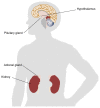Disturbances of the stress response: the role of the HPA axis during alcohol withdrawal and abstinence
- PMID: 15706736
- PMCID: PMC6761816
Disturbances of the stress response: the role of the HPA axis during alcohol withdrawal and abstinence
Abstract
Interactions among the brain, the pituitary gland, and the adrenal glands (i.e., the hypothalamic-pituitary-adrenal [HPA] axis) help regulate the body's response to stress. The adrenal hormone cortisol plays a key role in stress reduction through its effects on multiple body systems. Excessive cortisol activity during both chronic alcohol administration and withdrawal may underlie some of the clinical complications of alcoholism, including increased risk of infectious diseases; bone, muscle, and reproductive system changes; altered energy metabolism; and disorders of mood and intellect. Despite excessive cortisol levels during intoxication and withdrawal, however, the HPA axis becomes less responsive to stress during abstinence, potentially resulting in an impaired capacity to cope with relapse-inducing stressors.
Figures


References
-
- Adinoff B, Risher-Flowers D, De Jong J, Ravitz B, Bone GHA, Nutt DJ, Roehrich L, Martin PR, Linnoila M. Disturbances of hypothalamic-pituitary-adrenal axis functioning during ethanol withdrawal in six men. American Journal of Psychiatry. 1991;148:1023–1025. - PubMed
-
- Adinoff B. The alcohol withdrawal syndrome: Neurobiology of treatment and toxicity. American Journal of Psychiatry. 1994;3:277–288.
-
- Chrousos GP. Regulation and dysregulation of the hypothalamic-pituitary-adrenal axis: The corticotropin-releasing hormone perspective. Neuroendocrinology. 1992;21:833–858. - PubMed
-
- Costa A, Bono G, Martignoni E, Merlo P, Sances G, Nappi G. An assessment of hypothalamo-pituitary-adrenal axis functioning in non-depressed, early-abstinent alcoholics. Psychoneuroendocrinology. 1996;21:263–275. - PubMed
-
- Deroche V, Marinelli M, Maccari S, Le Moal M, Simon H, Piazza PV. Stress-induced sensitization and glucocorticoids. I. Sensitization of dopamine-dependent locomotor effects of amphetamine and morphine depends on stress-induced corticosterone secretion. Journal of Neuroscience. 1995;15:7181–7188. - PMC - PubMed
Publication types
MeSH terms
Substances
LinkOut - more resources
Full Text Sources
